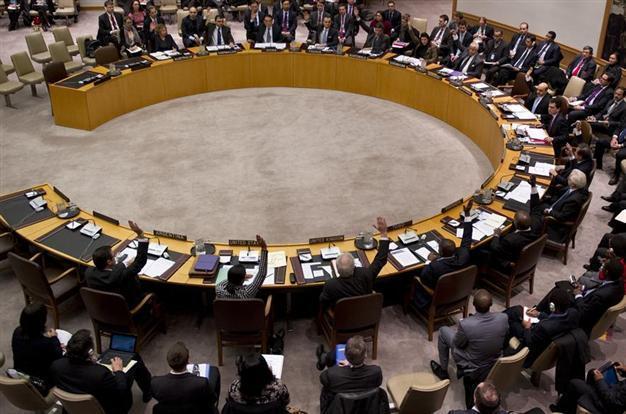N Korea threatens to scrap armistice accord
SEOUL/UNITED NATIONS

Members of the United Nations Security Council vote during a Security Council meeting on non-proliferation/Democratic People's Republic of Korea January 22, 2013 at the United Nations in New York. AFP PHOTO / DON EMMERT
North Korea threatened Tuesday to scrap the armistice signed in 1953 to end the Korean War, citing high tensions caused by joint South Korean-US military exercises, AFP has reported.
The North's military also said in a statement on state media that it would close a military hotline in the border truce village of Panmunjom.
UN to discuss N Korea sanctions after China, US deal The UN Security Council will meet Tuesday to discuss new sanctions against North Korea agreed by the United States and China, diplomats said, AFP has reported.
The closed door meeting was called by the Security Council presidency for 11:00am (1600 GMT). US and Chinese diplomats were to tell the other 13 council members of progress in their talks on action over the isolated North's February 12 atomic blast.
"There won't be a vote on Tuesday, but it could come soon. This is a sign that a draft resolution is about to be handed out," a UN diplomat told AFP on condition of anonymity.
Details of the proposed new sanctions resolution were not immediately available.
Russia's UN ambassador Vitaly Churkin, the council president for March, said earlier Monday that the United States had not yet circulated a draft text on North Korea, but it was expected soon.
South Korean foreign ministry spokesman Cho Tai-Young told reporters in Seoul that "considerable progress" had been made on the wording of a resolution.
"But no full agreement has been reached yet," Cho said.
US ambassador to the United Nations, Susan Rice, has been in talks with her Chinese counterpart, Li Baodong, on sanctions since North Korea staged its third nuclear test to near universal condemnation.
Within hours of the blast, all 15 council members backed a statement which said the North was in "grave violation" of existing UN resolutions and that they would go ahead with an earlier threat to take "significant action" against the North.
China, ever fearful of threats to stability on its frontier, has been reluctant to agree to tough new action, diplomats said. "There have been tough talks between the United States and China," the UN envoy said.
North Korea said its third nuclear test in seven years was a riposte to "US hostility" shown in the widening of existing UN sanctions following its rocket launch in December last year.
The North says its long-range missile can now reach US territory. It has angrily warned that it will not be bound by UN resolutions in what diplomats have said is a strong indication that a new nuclear test or rocket launch could be tried.
The Security Council ordered wide-ranging sanctions against the North after its 2006 and 2009 nuclear tests.
In 2006, the council ordered an embargo on arms and material for ballistic missiles against the North. It also banned exports of luxury goods and named individuals and companies to be subject to a global assets freeze and travel ban.
In 2009, the council banned North Korea's weapons exports and ordered all countries to search suspect shipments.
These measures were expanded after the long-range rocket launch in December, which the United States and its allies said was a test of a ballistic missile carrier. The rocket took a satellite into space.
There are currently 17 North Korean banks, trading companies and other entities on the UN sanctions list for an assets freeze. Nine individuals linked to the nuclear program or efforts to finance it face an international travel ban and assets freeze.
Reports by UN sanctions experts have regularly indicated that prohibited luxury goods and other material getting in and out of North Korea are passing through China.
